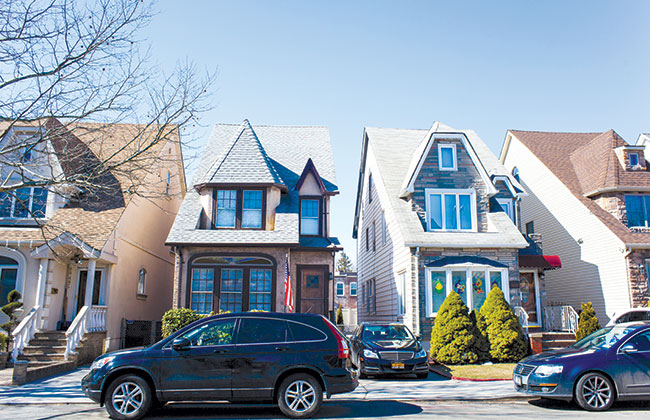While walking the streets of her neighborhood, Anna Jackson noticed things she hadn’t before. What she saw led her congregation to make some changes.
Anna Jackson’s daily walk helped her church get reacquainted with its neighborhood
Queens Reformed Church has sat on the same street corner in its New York borough since 1858. It’s the oldest church in what has increasingly become an immigrant community, populated by transplants from the Caribbean, India, Pakistan, Haiti, and Bangladesh.
And yet, it was the smell of curry wafting from houses nearby and an abundance of vegetable gardens sprouting from front yards that recently reminded the church: it didn’t really know its neighbors.
“Just because I thought I knew the neighborhood, because I’ve been there so long, doesn’t mean I actually know,” says Queens Reformed pastor Anna Jackson, who has led the 50-member, multiracial congregation for the past 15 years.
Jackson recently participated in a pilot program from the RCA called the Ezra Project, in which a small group of African American, urban RCA ministers gathered several times for coaching, leadership development, and sharing success stories. During this time, Jackson was challenged to take neighborhood walks in order to relearn the community. This meant walking 15 minutes each day in a different direction from the church to observe, listen, and even smell.
“It was just fascinating to meet people and see things going on that I never even knew existed,” says Jackson of her walks around the Queens Reformed neighborhood. “On one block there were Hindu flags, a statue of Mary, a Muslim emblem. There was just this wonderful smell of curry at one house—you’d be surprised at the smells that come from people’s houses. And on every single block, people were growing vegetables. We have a lot of farmers in the city! It made me wonder, where are you coming from? Did you grow up in a rural area and bring that heritage with you?
“I learned how much there is to still learn. It was a completely different thing to walk the neighborhood with intention.”
Jackson took members of her consistory on the walks, and they, too, felt the impact almost immediately. Soon they had formed a small group of elders, deacons, and other members in which Jackson saw leadership potential. And for the past five months, they’ve been meeting regularly to discuss the Queens community and what they as a church can do differently to reach out and make a difference in the area.
“Our church’s mission is ‘loving God and loving neighbor’—even before we started this, that was our mission,” says Jackson. “Within a mile of the church, there’s 50,000 or more people. How do you even begin to get a sense of these people? What does it mean to love our neighbor? Is it only to do things for, or is it also to do things with [them]?”
The group started by brainstorming all sorts of community ministry possibilities, with a “sky’s the limit” mentality. But over time, each member of the group felt God calling them to three specific focus areas: a community kitchen, community education opportunities, and doing more to engage Queens Reformed members within the church.
Of the community kitchen, “we have a lot of people, not necessarily homeless, but who are in need,” says Jackson. The goal is to start operating in the fall with biweekly luncheons, and see how it grows from there. Its organizers are talking with local grocers about donating day-old baked goods and other foods just past their “sell-by” dates, and Jackson says the response has been positive. In addition, she says people in the neighborhood who are not members of Queens Reformed are already talking about wanting to help.
The same mentality drives the educational component. The church is starting community classes that carry wide appeal, such as a class on African history taught by a local professor, which was held at the church in February during Black History Month. But they’re also looking to fill educational needs within the neighborhood.
“A lot of financial education topics have come up,” says Jackson. “What can we do to help people whose homes have been foreclosed on, or who might be facing that? Can we offer classes on how you can avoid [foreclosure]?”
Jackson says the initiative to engage more members of Queens Reformed is being led by one elder and one deacon who are “literally just connecting with people—making phone calls, sitting with new people at church, building relationships. So many people get lost at church—I think this will help a lot in terms of making people feel more connected. And then, once that happens, we can discern where people’s passions are and connect them to our community ministries.
“My hope is that this work will help create bridges organically. If members are more connected to our ministries—an engaged congregation is huge.”
While these ministry ideas are only just getting started, Jackson says she’s already excited by the progress that’s been made. And since so many of the efforts are being led by members of the congregation, she’s happy to be a cheerleader, encouraging them to dream big as they seek to both know and love their neighbors.
“I just want to see people get out of the building. Go for a walk. You may be surprised at what you see,” she says.
“For so long I was thinking that people really need to come to us—but it’s really become clear that we’re being sent. It changes your whole perspective on ministry.”
Take a walk in your neighborhood. What do you notice that you hadn’t before?
Brainstorm ways your church can love its neighbors by doing things with rather than for them.
Curious about the Ezra Project? Email Tony Campbell at tcampbell@rca.org.
[Photo: ©iStockphoto.com/sx70]





